Just In
- 3 hrs ago

- 5 hrs ago

- 6 hrs ago

- 8 hrs ago

Don't Miss
- Education
 KCET 2024: Candidates can raise objections against questions in UGCET, Know more
KCET 2024: Candidates can raise objections against questions in UGCET, Know more - News
 TS Inter Results 2024 Manabadi: 1st And 2nd Year Results Expected Soon
TS Inter Results 2024 Manabadi: 1st And 2nd Year Results Expected Soon - Sports
 IPL 2024: Gautam Gambhir Always Knew Sunil Narine Would Become A T20 Legend
IPL 2024: Gautam Gambhir Always Knew Sunil Narine Would Become A T20 Legend - Movies
 Aavesham OTT Rights: Fahadh Faasil's Latest Action Comedy By Jithu Madhavan Closes A Crazy Deal
Aavesham OTT Rights: Fahadh Faasil's Latest Action Comedy By Jithu Madhavan Closes A Crazy Deal - Finance
 Elon Musk Postpones India Trip, Tesla's Indian Market Entry Delayed
Elon Musk Postpones India Trip, Tesla's Indian Market Entry Delayed - Technology
 Best Noise-Cancelling Earbuds Under Rs 5,000: CMF Buds Pro, Redmi Buds 5, Realme Buds Air 5, and More
Best Noise-Cancelling Earbuds Under Rs 5,000: CMF Buds Pro, Redmi Buds 5, Realme Buds Air 5, and More - Automobiles
 Tesla CEO Elon Musk's Much-Awaited Visit to India Deferred, Leaving Questions Unanswered
Tesla CEO Elon Musk's Much-Awaited Visit to India Deferred, Leaving Questions Unanswered - Travel
 Journey From Delhi To Ooty: Top Transport Options And Attractions
Journey From Delhi To Ooty: Top Transport Options And Attractions
15 Indian Spices And Their Amazing Health Benefits
Spices are the backbone of Indian cuisines. It is the base on which the taste, flavour, aroma and richness of a dish depends. Apart from the flavour, the main reason why spices hold a great value in Indian cuisine is because of the amazing health benefits they deliver to people.

Every spice has its own aroma, flavour and health benefits. They are available mainly in dried and powder forms and known to enhance any dish they are added to. Apart from this, spices are also low in fat and calories. Here is a list of some of the Indian spices which are widely used for their health benefits and rich flavours.

1. Turmeric (Haldi)
This yellow-coloured spice is rich in curcumin that has a lot of health benefits. Curcumin in turmeric has potential benefits to prevent heart diseases, cancer and Alzheimer's. It also has anti-inflammatory and antioxidant properties that help to treat symptoms of arthritis and mental health problems. [1]

2. Black Pepper (Kali Mirch)
It is among the most popular spices in India, which is also famous around the world. The sharp pungent of black pepper can make any dish delicious. Black pepper is helpful for gastrointestinal health and helps to boost the body's metabolism. It is also known for its anti-cancer and anti-microbial properties. [2]
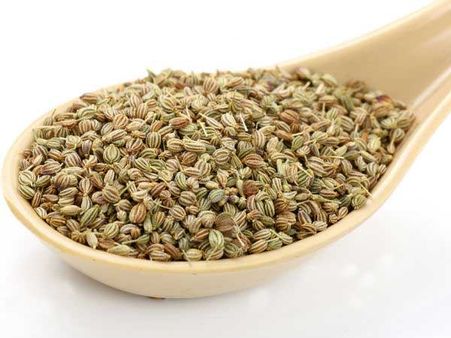
3. Carom Seeds (Ajwain)
This partially-bitter spice is widely used for quick relief from stomach pain, bloating and other digestive problems. Carom seeds are a powerhouse spice that helps to treat cough and cold and prevents the risk of kidney stones. [3]
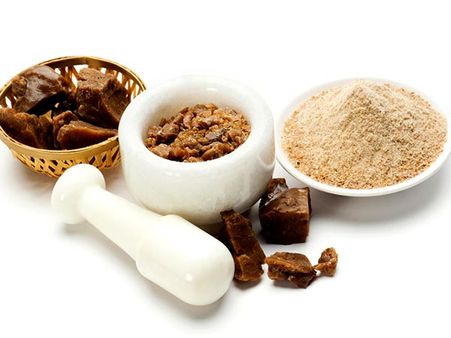
4. Asafoetida (Heeng)
It is considered a wonderful flavouring spice in Indian cuisines. Asafoetida helps in treating cough, digestion and lung-related ailments. This antibiotic spice is also known to treat excessive menstruation pain in women. [4]
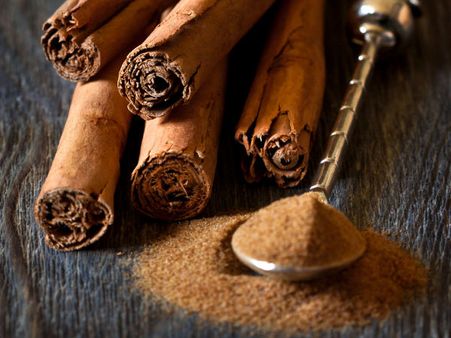
5. Cinnamon (Dal-Chini)
This multipurpose spice holds a great value in every kitchen. Cinnamon is best known to manage glucose levels in our body and keep our cholesterol under control. It is also used to make sweet dishes, soups, meals, medicines and even perfumes. Cinnamon also helps to treat gum diseases. [5]
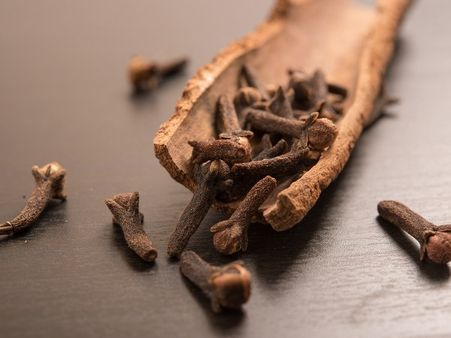
6. Cloves (Long)
This wonder spice is sweet and aromatic with a lot of healing properties. Cloves are used for centuries due to its antioxidant, antiseptic and antibacterial properties. The spice also helps to treat stomach problems, toothache and insomnia. [6]
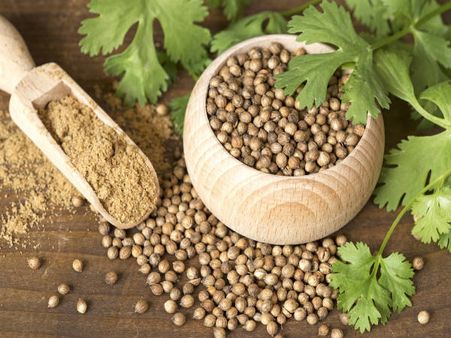
7. Coriander Powder (Dhania powder)
It is a common herb used in almost every kitchen. Coriander powder is prepared from coriander seeds which are an excellent source of antioxidants and dietary fibre. This spice is beneficial for the liver, intestines and digestive problems. [7]
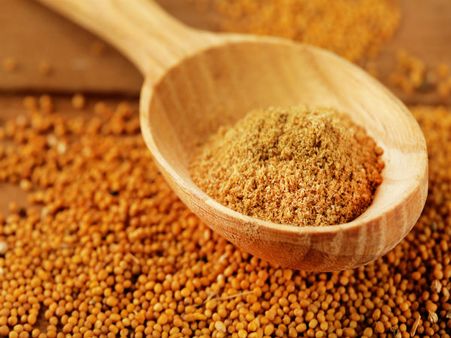
8. Mustard Seeds (Sarso Powder)
They are small, round yellow-coloured seeds with a lot of flavours. Mustard seeds are also compressed for oil. They are loaded with vitamin B-complex which is effective to relieve symptoms of arthritis, especially joint pain. Including mustard seeds regularly in the diet improves heart health by lowering bad cholesterol and helping in blood circulation. [8]
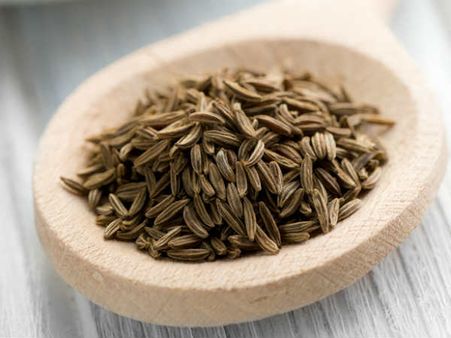
9. Cumin Seeds (Jeera)
They are a small brownish spice commonly used for sauteing foods as it adds flavour to the dish. Cumin seeds are well-known to possess antioxidant, anti-inflammatory and anti-microbial properties. They help to aid digestion, asthma and anaemia along with promoting weight loss and treating food infection. [9]

10. Cardamon (Elaichi)
This spice is known mainly for its rich flavour and aroma. Elaichi is full of health benefits and makes for the most demanded aftermeal freshener. The spice helps treat numerous digestive problems like bloating and heartburn and also known to have anti-cancerous properties. [10]
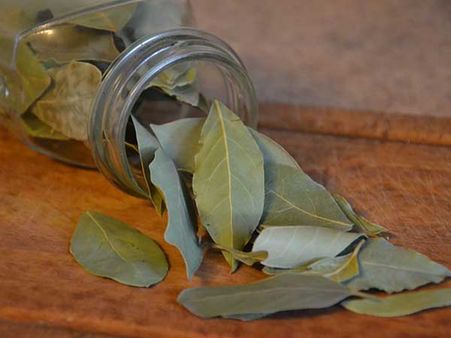
11. Bay Leaf (Tej Patta)
This leafy spice is used in Indian kitchens since ancient times. Tej patta is a widely used spice due to its anti-diabetic anti-ageing properties. It helps in the body's detoxification process as well as boosts the immune system. [11]
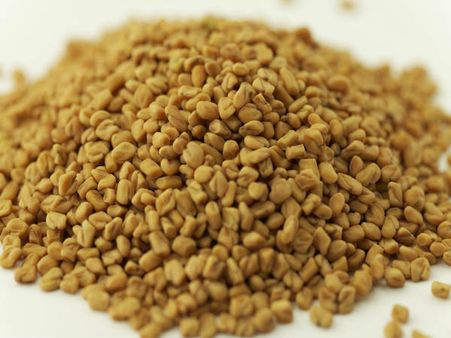
12. Fenugreek Seeds (Methi)
The seeds and leaves of fenugreek are widely used in Indian cuisines. Methi is well-known to lower blood pressure, cholesterol levels and reduce inflammation. It also helps increase milk production during lactation and increase libido in men. [12]
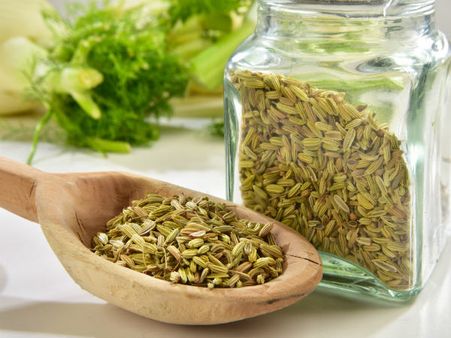
13. Fennel Seeds (Saumph)
They are widely used as a mouth freshener in India. Saumph is packed with folate, fibre, vitamin C, vitamin B6 and potassium - all of which act as a wonder for the heart health. This sweet and scented spice also helps to lower cholesterol levels and prevent the risk of neurological diseases. [13]

14. Star Anise (Chakra Phool)
This star-like spice is famous for its unique and strong flavour. Star anise is used in very few dishes, especially in savoury and rice dishes. The spice is best used to treat cough, flu, digestion, nausea and menstruation cramps. Also, chakra phool tea is great for digestive problems. [14]

15. Nigella Seeds (Kalonji)
Nigella seeds are also known as black cumin due to its tiny black appearance. The seeds contain a unique compound called thymoquinone that helps to reduce inflammation and mutant cell proliferation. Kalonji also helps in detoxifying the liver and improving hair and skin health. [15]
Common FAQs
1. What spices are good for heart health?
Spices like cinnamon, cumin seeds, fennel seeds, turmeric and mustard seeds are very good for heart health. They help to lower the cholesterol level and prevent clogging of arteries, hence preventing the risk of stroke and coronary artery diseases.
2. Do dried spices have health benefits?
Yes, dried spices have several health benefits. They are in fact, healthier than fresh herbs as all the polyphenols and flavours get concentrated inside them, making them more enriched with these active compounds. Also, dried spices last for long in the kitchen.
3. Is mixed spice good for you?
Mixed spice is a blend of ground spices like cinnamon, nutmeg, cloves, ginger, coriander and mace. In mixed spice, usually cinnamon dominants the flavour. From the health prospect, mixed spice helps to lower the glucose level in the body, fights inflammation, reduces oxidative stress and lowers the cholesterol levels.
-
 healthHerbs That Reduce Burn Belly Fat In Two Weeks!
healthHerbs That Reduce Burn Belly Fat In Two Weeks! -
 healthWorld Cancer Day 2024: Exploring Anti-Cancer Properties Of Indian Herbs And Spices Which Are Natural Healers
healthWorld Cancer Day 2024: Exploring Anti-Cancer Properties Of Indian Herbs And Spices Which Are Natural Healers -
 healthHealth Benefits Of Garam Masala: From Digestion To Weight Loss, Proper Use Can Yield Many Benefits
healthHealth Benefits Of Garam Masala: From Digestion To Weight Loss, Proper Use Can Yield Many Benefits -
 healthAyurvedic Herbs And Spices Commonly Used During Onam And Their Benefits
healthAyurvedic Herbs And Spices Commonly Used During Onam And Their Benefits -
 healthSay Goodbye To Sweat Smell: 5 Aromatic Spices For Natural Freshness
healthSay Goodbye To Sweat Smell: 5 Aromatic Spices For Natural Freshness -
 healthSpice Up Your Weight Management: Indian Spices For Healthy Weight Loss
healthSpice Up Your Weight Management: Indian Spices For Healthy Weight Loss -
 healthSpice Up Your Diet To Combat Monsoon Hair Loss
healthSpice Up Your Diet To Combat Monsoon Hair Loss -
 healthHealthy Living Unveiled: Discover the 10 Secrets of Indian Grandmothers
healthHealthy Living Unveiled: Discover the 10 Secrets of Indian Grandmothers -
 pulseITC Sunrise Celebrates Event Success In Jharkhand, Women Steal The Show With Superlative Culinary Skills
pulseITC Sunrise Celebrates Event Success In Jharkhand, Women Steal The Show With Superlative Culinary Skills -
 pulseFun Event By ITC Sunrise Spices Kickstarts In Jharkhand, Creates Ripple Effect Among Women And Foodies
pulseFun Event By ITC Sunrise Spices Kickstarts In Jharkhand, Creates Ripple Effect Among Women And Foodies -
 pulseA Fun Event By ITC Sunrise Spices In Jharkhand Witnesses Surge In Footfall, Women Winning Contests, And More
pulseA Fun Event By ITC Sunrise Spices In Jharkhand Witnesses Surge In Footfall, Women Winning Contests, And More -
 pulseSunrise Spices That Connects 100 Years Of Rich Culinary Heritage Of Jharkhand
pulseSunrise Spices That Connects 100 Years Of Rich Culinary Heritage Of Jharkhand


 Click it and Unblock the Notifications
Click it and Unblock the Notifications



